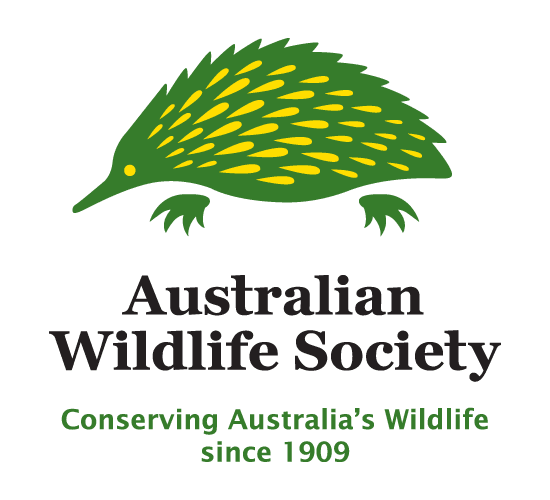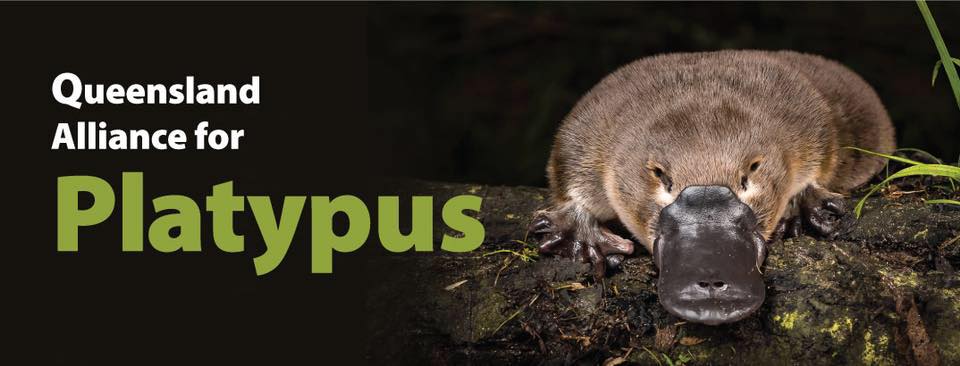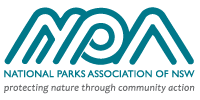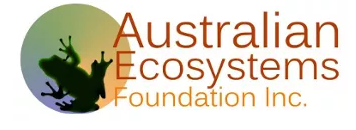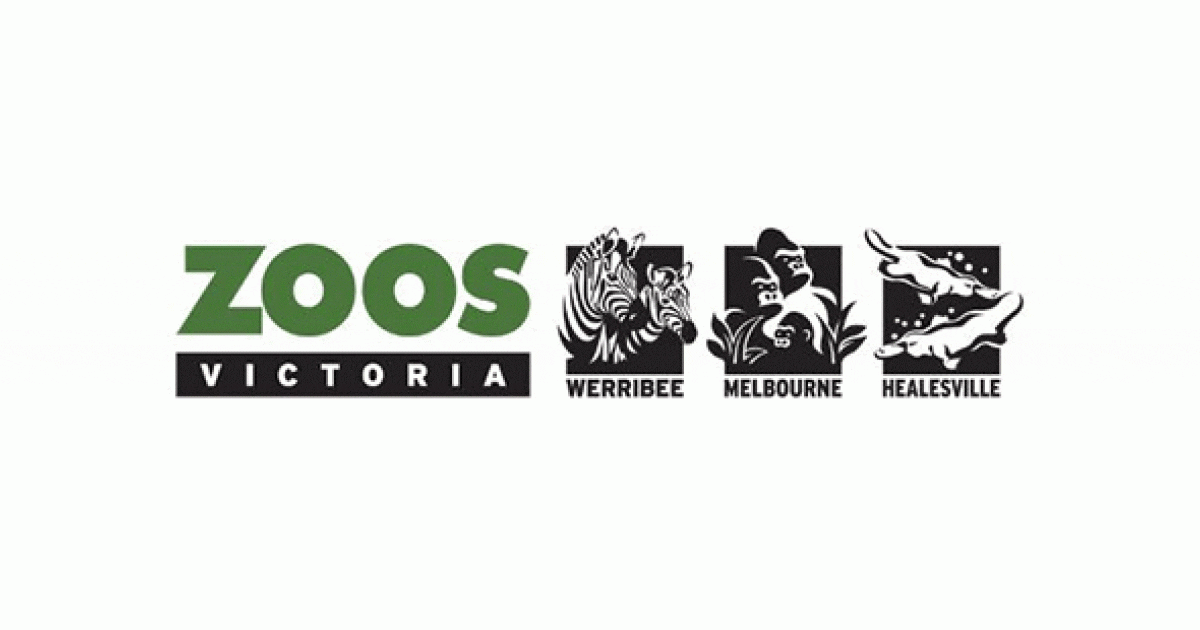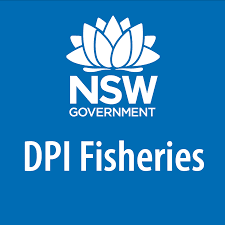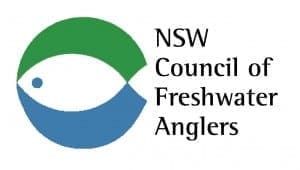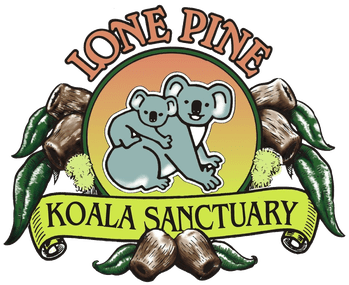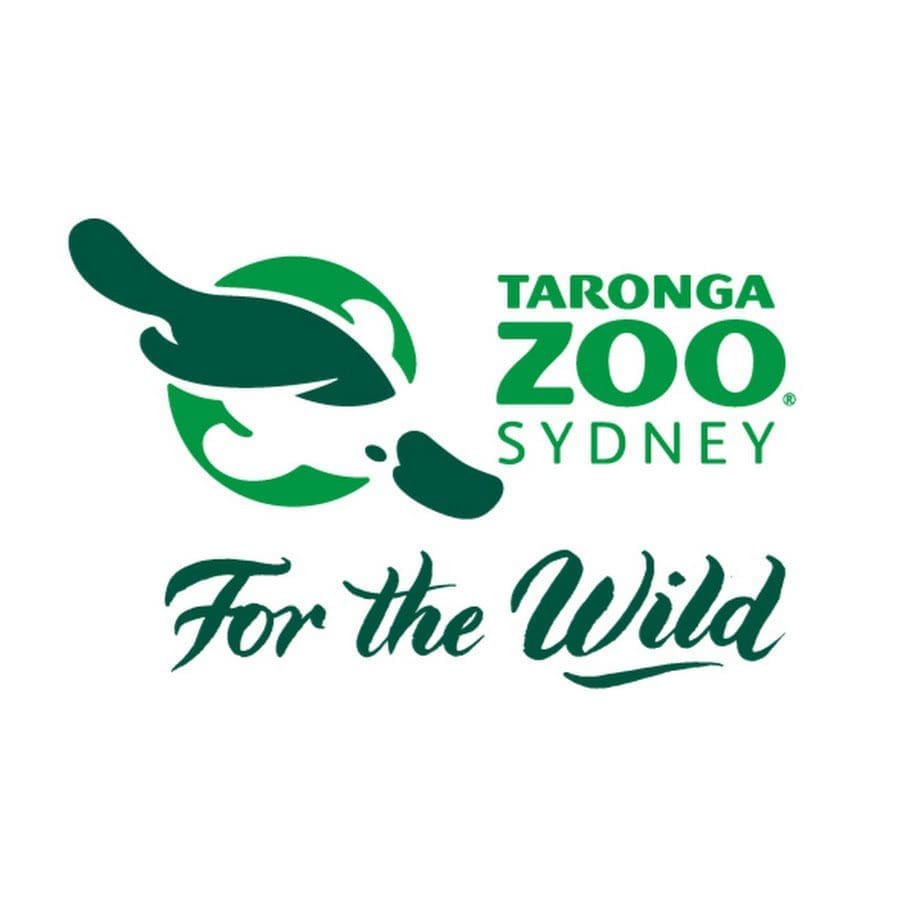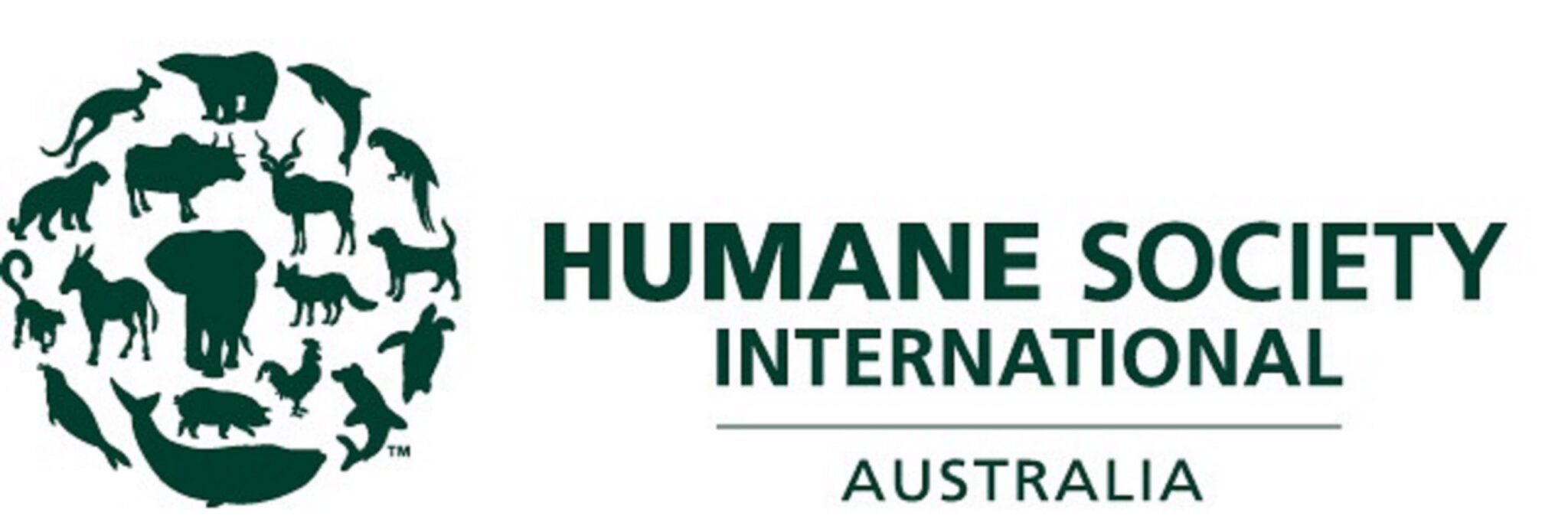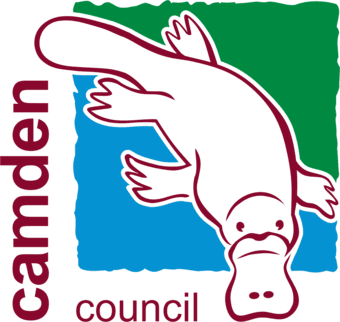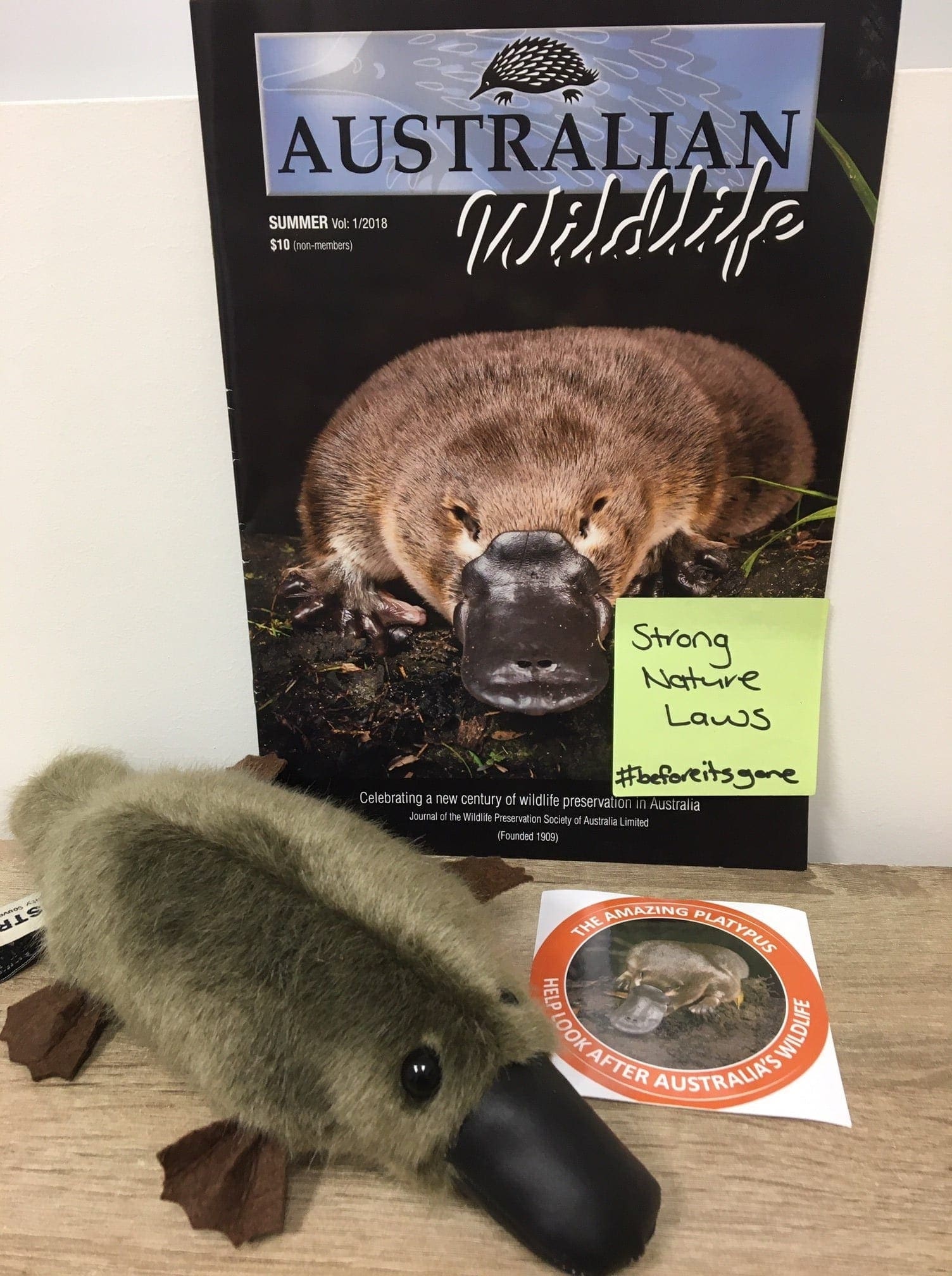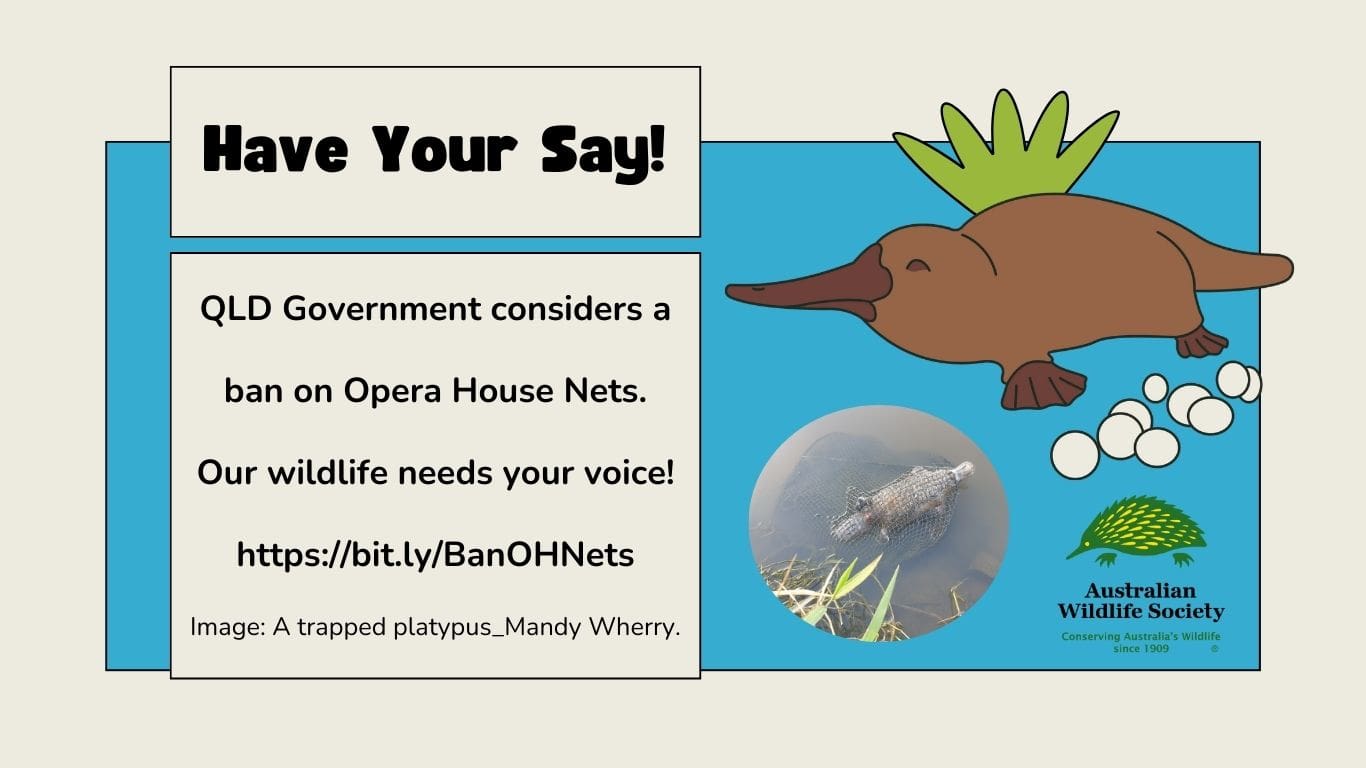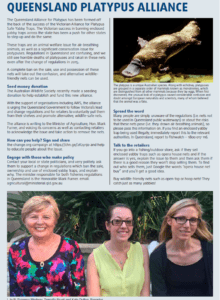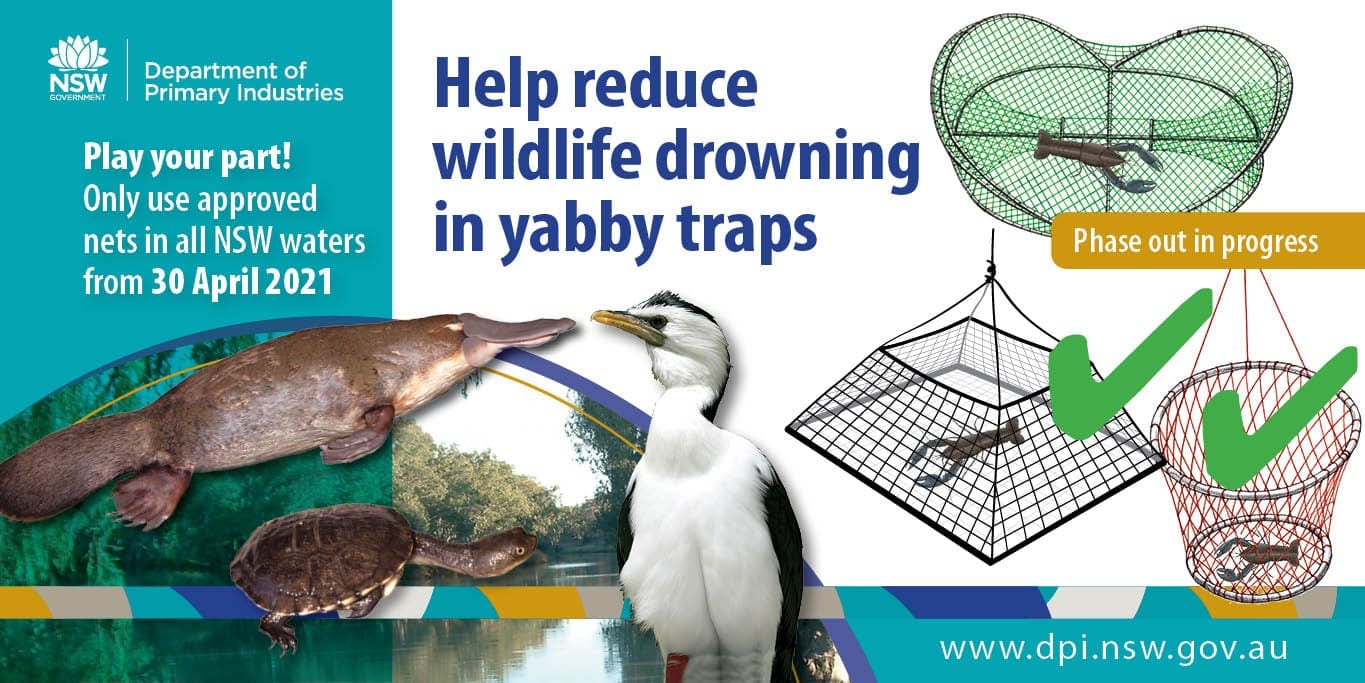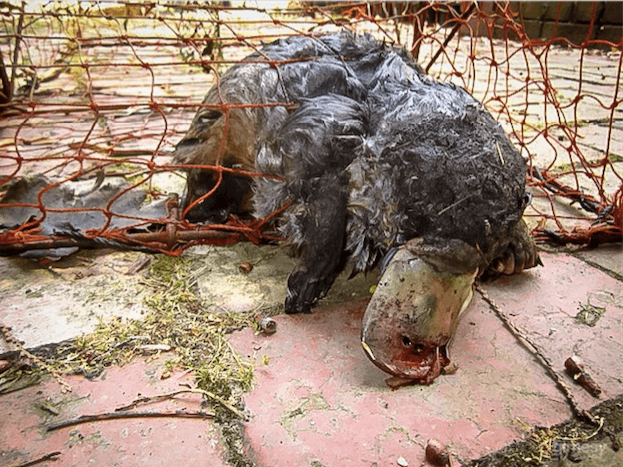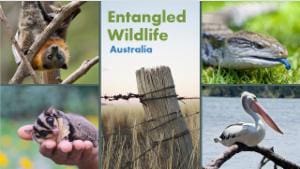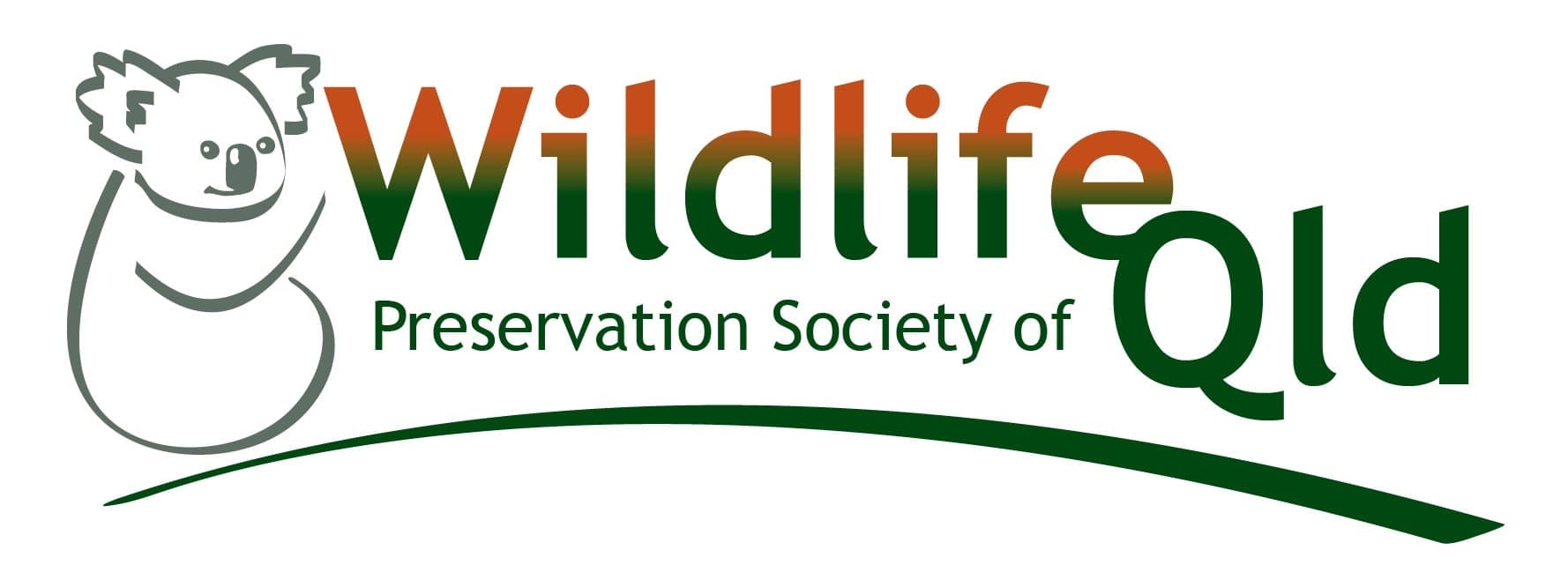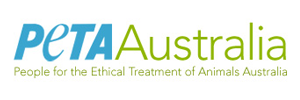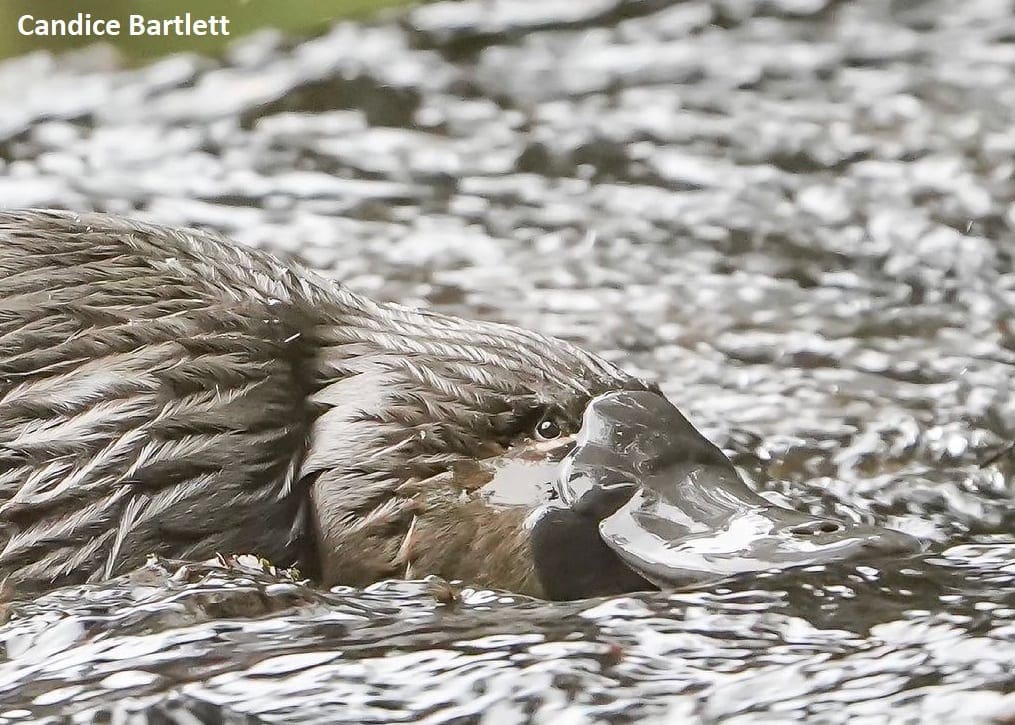

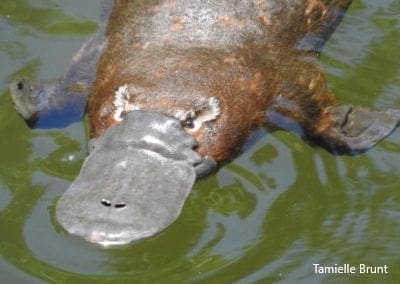
Fisheries Queensland is seeking your feedback on fishery reform options for recreational fishing in Queensland, including the proposed ban on opera house-style nets (enclosed yabby traps).
Opera house-style nets present risks to semi-aquatic, air-breathing native animals, including platypus, rakali, and turtles. As a result, most Australian states and territories have banned or restricted the use of this trap.
Ecologist and Wildlife Queensland PlatypusWatch Project Officer, Dr Tamielle Brunt, explains why you should consider supporting the ban HERE
Submissions close at 5 pm on Thursday, 9 May 2024.
Queensland Platypus Alliance
When will Queensland step up and follow the lead of the other states in Australia to protect our precious and iconic native Australian wildlife? It is time the current legislation/regulations were reviewed and a ban on enclosed yabby traps implemented.
- In January 2017, a platypus was found dead in Lockyer Creek, Queensland, after being trapped in an enclosed yabby trap. A rakali was also found drowned in an enclosed yabby trap at Wivenhoe Dam, Queensland.
- In November 2019, two eastern water dragons were found trapped in an enclosed yabby trap at Woogaroo Creek, Queensland. One of them drowned; the other one was exhausted and transported to RSPCA Queensland for care.
- More recently, in February 2021, an eighty-year-old crocodile was found dead in a crab pot in Queensland after it completed a death roll, became entangled, and could not escape.
We are now asking the Queensland Government to follow the lead of other states in Australia and:
- Implement legislation to ban enclosed yabby traps,
- Prohibit the sale of enclosed yabby traps by retailers,
- Implement a net exchange program and phase out the use of enclosed yabby traps, and
- Furthermore, education and enforcement around eliminating enclosed yabby traps and the potential danger to bycatch is needed.
Our current actions have an extreme impact on our precious native wildlife, but there is a safe and effective alternative – open-top pyramid nets. Victorian Fisheries have tested the open-top pyramid nets with a comparable catch rate to enclosed yabby traps.

Outdated (enclosed yabby trap)
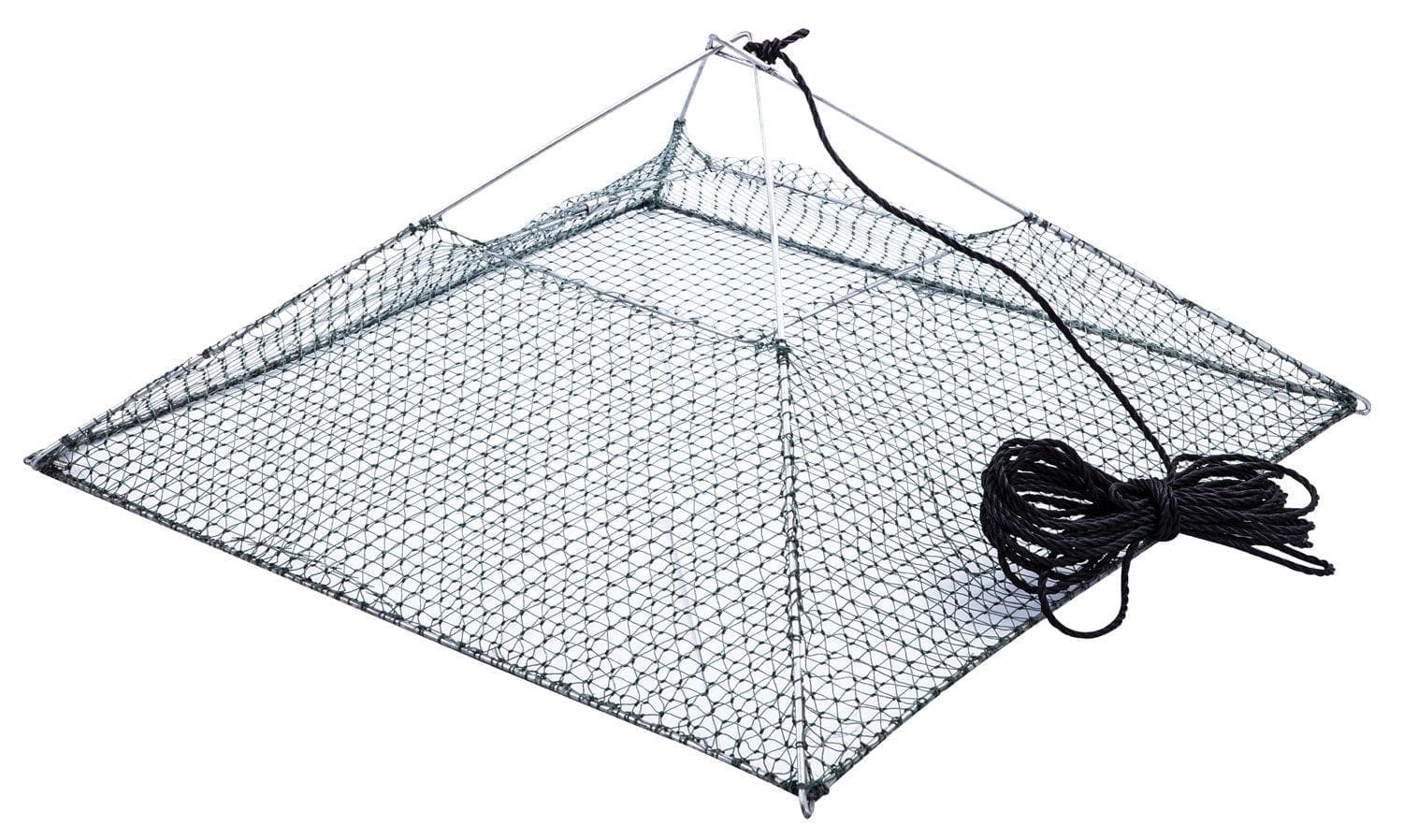
Wildlife-friendly alternative (open-top pyramid net)
Can you spare a minute to help protect platypus and other air-breathing semi-aquatic wildlife from drowning horrible deaths in enclosed yabby traps?
Please sign PETA’s petition or write a letter to the Queensland Minister for Agricultural Industry Development and Fisheries.
Report a Sighting
By reporting where and when you have seen a platypus, and other semi-aquatic air-breathing wildlife, you will make a positive contribution to understanding the status, distribution, and conservation needs of this species. The valuable body of information will support wildlife conservation efforts and develop appropriate conservation strategies to bring about positive changes for native wildlife
NSW Platypus and Turtle Alliance
The Australian Wildlife Society met with NSW Minister for the Environment, Matthew Kean MP, on behalf of the NSW Platypus and Turtle Alliance, at Parliament House on Wednesday 13 November 2019. The alliance asked the Minister to implement a complete ban on opera house nets, across the state, and implement a net exchange program to help save platypus and other air-breathing aquatic wildlife from drowning in New South Wales rivers. The Society is pleased to announce that our efforts, along with others, have been recognised, with a complete ban on opera house nets to be implemented, in New South Wales, effective from 30 April 21.
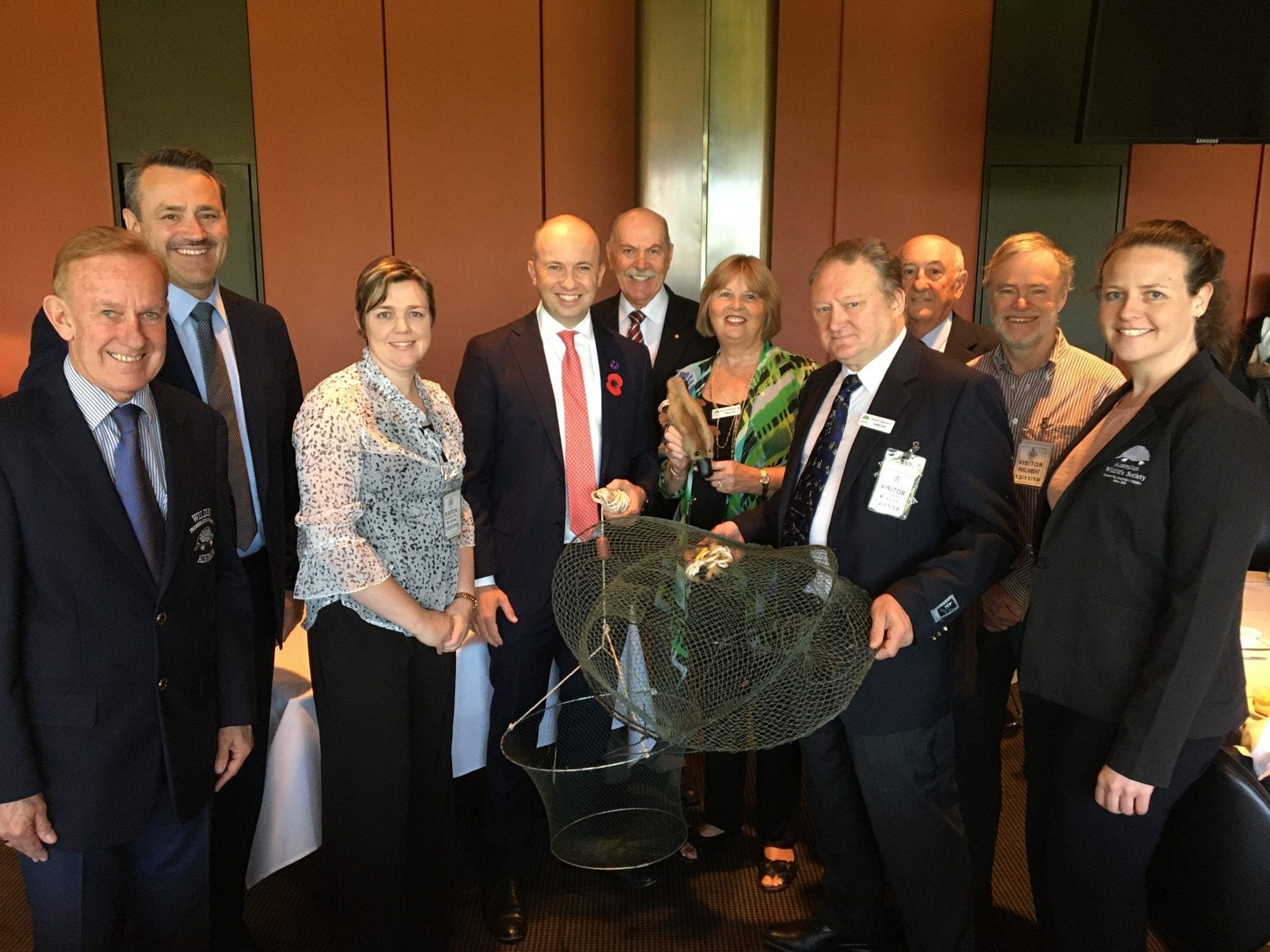
L to R: Philip Sansom, Stephen Kamper MP (Member for Rockdale), A/Professor Julie Old, Matthew Kean (Minister for the Environment), Patrick Medway, Suzanne Medway, Wayne Greenwood, Ken Mason, Professor Richard Kingsford, Megan Fabian.
FORMATION OF THE ALLIANCE
1. To develop an agreed and coordinated strategy to address the issue of platypuses and other air-breathing aquatic wildlife deaths in enclosed yabby traps.
2. To ensure that we do not waste time and effort by fragmenting resources, stepping on toes, doubling up or diluting effectiveness by multiple, non-strategic communications.
In NSW, air-breathing aquatic wildlife are being caught and drowning horrible deaths in ‘set and forget’ enclosed yabby traps such as opera house nets (the most common type used). This has been going on for years. The use and possession of yabby/opera house traps are banned in public waters east of the Newell Highway and in three stretches of river west of the Newell Highway: the Edward River upstream of Stevens Weir, the Murray River upstream of the Echuca/Moama Rd Bridge and the Murrumbidgee River upstream of Darlington Point Rd Bridge. All yabby traps are required to have a bycatch reduction device with a maximum diameter of 90mm (fixed ring) fitted to all entrance funnels. The intent of the general yabby trap closure and the bycatch reduction device is to prevent the death of platypuses and minimise the capture of air-breathing aquatic wildlife such as turtles and water rats. However, there is still confusion around these current regulations and traps (with any entrance size) are being used illegally in freshwater waterways and still causing deaths. Therefore, this indicates that many people are either unaware of the law or intent on ignoring it. We believe current regulations, although a step in the right direction, is not sufficient to prevent avoidable deaths. Wildlife-friendly nets such as open-topped or hoop nets should be successfully promoted to recreational fishers to achieve their catch of crayfish. Information sheet >>
Furthermore, these vile traps allow the air-breathing aquatic wildlife to enter but not find their way out, and so in just a few minutes, the results are inevitable and tragic. To make matters worse, when abandoned in a waterway, these traps ‘ghost fish’ – meaning even after one animal is captured and killed, they can continue to capture and drown other animal’s infinitum, over days, weeks or years. Another concern specifically to the female platypuses is that many enclosed yabby traps are used during the summer months when the females are foraging for food to nourish their babies. If a mother platypus dies, her young will certainly also starve to death. The nets are cheap in retail stores and on-line, many with no warnings on legislation or the risks to platypuses and other air-breathing aquatic wildlife. Just recently Victoria took a lead in announcing a ban on these traps and a swap-out scheme to safer traps, and many retailers such as eBAY, Big W, Kmart and Anglers Warehouse voluntarily withdrew their sales.
STRATEGY
The NSW Platypus and Turtle Alliance is advocating for a full-ban on enclosed yabby traps (sale, use, and possession) in NSW to protect Australia’s air-breathing aquatic wildlife such as platypuses, turtles and rakali. Our mission is to prevent the indiscriminate cruel drowning deaths of platypuses and other air-breathing aquatic wildlife in NSW that occur via the use of enclosed yabby traps such as opera house nets. We are not against yabby fishing, we would just like to see it happen in a way that is safe for platypuses and other air-breathing aquatic wildlife. The alliance is being formed off the back of the success of the Victorian Alliance for Platypus Safe Yabby Traps and Queensland Alliance for Platypus. The Victorian success in banning enclosed yabby traps across the state has been a push for other states to step up and do the same. Legislation in the ACT has also been passed.
We are following four strategies which have been adapted from the Victorian Alliance for Platypus Safe Yabby Traps and Queensland Alliance for Platypus:
1: Changing legislation/regulation
We want traps that kill air-breathing aquatic wildlife to be prohibited, and specifically legislation/regulations to ban the sale, possession and use of enclosed yabby traps in NSW.
Such legislation in NSW could include:
- Banning these traps via the relevant Animal Welfare legislation.
- Extending the relevant Fisheries legislation/regulation to ban their use in all waters.
- Considering ways to ban them on pure current and potential species conservation concerns. The platypus is already listed as ’near threatened’ via the International Union for Conservation of Nature.
2: Eliminating supply
We want Australian manufacturers such as Anaconda and other suppliers to voluntarily and immediately stop producing and selling enclosed yabby traps (especially opera house nets). In the interim, we want them to immediately and clearly label these traps with a warning that these are potential death traps for air-breathing aquatic wildlife.
3: Reducing in-field usage
We want owners/users to immediately stop using the traps that they have, on public and private land. This could be accomplished before (and after amended regulation) by increased awareness/education which the alliance will work on.
4: Increasing enforcement
We want the public to report the use of any illegally used traps to authorities. This could be achieved by increased awareness/education which the alliance will work on.
QUEENSLAND AND VICTORIAN PLATYPUS ALLIANCE
The Queensland Alliance for Platypus has been formed off the back of the success of the Victorian Alliance for Platypus Safe Yabby Traps. The Victorian success in banning enclosed yabby traps across the state has been a push for other states to step up and do the same.
These traps are an animal welfare issue for air-breathing animals, as well as a significant conservation issue for platypuses. Regulations in Queensland are confusing, and we are still seeing horrible deaths of platypuses and rakali in these nets, even after the change of regulations in 2015. A complete ban on the sale, use, and possession of these nets will take out the confusion and alternatively, wildlife-friendly nets can be used.
The Australian Wildlife Society (AWS) made a seeding donation to help establish and fund The Queensland Alliance. With the support of organisations including AWS, the alliance is urging the Queensland Government to follow Victoria’s lead and change regulations and for retailers to voluntarily pull them from their shelves and promote alternative, wildlife-safe nets.
VIC update:
From 1st July 2019, opera house nets will be banned in all public and private waters throughout Victoria, a reform that will benefit air-breathing native animals that live in and around waterways such as platypus, turtles, and rakali. Enclosed yabby traps like opera house nets have been prohibited equipment in public waters for many years, however it appears some fishers who had previously purchased these were unaware they could not be used in Victorian public waters. Open-top lift nets, hoop nets, bait traps, and baited lines all remain legal yabby fishing gear, and research by the Victorian Fisheries Authority (VFA) has shown that these wildlife-friendly open-top lift nets and hoop nets can catch just as many yabbies as opera house nets. These changes still allow Victorian fishers to store opera house nets in their homes or sheds for interstate use where they are permitted.
Last year the Victorian Labor Government and the VFA initiated a yabby net swap program that offered a free one-for-one swap of an opera house net for a new open-top lift net and since then, 20,000 new open-top lift nets have been swapped over to fishers, with nearly 70 participating tackle shops across the state. Ahead of the ban, many stores proactively stopped selling these nets last year in Victoria, however sadly, some retailers continue to do so.
– Doug Gimsey
Doug, a man of many talents, completed a Bachelor of Science, Masters of Environment and Masters of Bioethics. Doug runs a science/environmentally-focused communication consultancy called The Framing Effect, whose aim is to help people influence more effectively, both with words and images. Doug is the chair of the Victorian Alliance for Platypus-Safe Yabby Traps – a collective established to prevent the cruel drowning deaths of platypus in Victoria that occur via the use of enclosed yabby traps.
QLD update:
The Queensland Alliance is gaining data on the uses of enclosed yabby traps in the state, they are also taking action towards educating people and persuading retailers to opt for the wildlife-friendly options. Research has reported that wildlife-friendly yabby traps are just as effective at capturing yabbies while reducing the risk of capturing bycatch such as platypus, rakali and other air-breathing animals.
The Queensland Alliance is educating people about the common misunderstandings about the regulations and nets. ‘PlatypusSPOT’ clarifies some of the common misunderstandings (http://platypusspot.org/blog/general-news/how-can-we-allow-platypuses-to-drown-for-a-few-yabbies).
Victoria has successfully banned these enclosed yabby traps and Queensland and NSW need to follow. We encourage people to have a conversation with fishing fanatic friends and tell them about the alternatives. Also, keep a watchful eye out for these nets in your waterways and report to the specific fishing authority. “Are a few yabbies worth the death of an iconic Australian? Definitely NOT!”
If you have seen a yabby trap in a local waterway in Queensland (since 2015), The Queensland Alliance want to hear from you: ![]() https://tam058381.typeform.com/to/myvGya.
https://tam058381.typeform.com/to/myvGya.
Tamielle is a Ph.D. candidate studying “the distribution, health, and threats to platypus populations in Queensland” at the University of Queensland. Tamielle has extensive research and field experience in Platypus and biodiversity surveying and has published her research and presented her work at several events. Tamielle is the ‘PlatyCount’ Volunteer Project Officer at the Wildlife Preservation Society of Queensland. Tamielles’ passion for the Platypus is prominent through the work she does. Thank you Tamielle. Watch Tamielle’s presentation.
NSW update:
Urgent action in NSW is needed. AWS, in partnership with Queensland Alliance, Victorian Alliance, will be addressing this issue in New South Wales. AWS will write to all companies that sell yabby nets and ask them to withdraw these nets from their sale and lobby the NSW government to ban the use of nets in New South Wales
How you can help:
* Contact your local or state politicians – very politely ask them to support a change in regulations which ban the sale, ownership, and use of enclosed yabby traps, and explain why.
* Spread the word – many people are simply unaware of the regulations (i.e. not to be used in Queensland public waterways) or about the risks that these nets pose (i.e. they drown air-breathing animals), so please pass this information on. If you find an enclosed yabby trap being used illegally, immediately report this to the relevant authorities. In Queensland, report to Fishwatch − 1800 017 116.
* Talk to the retailers – if you go into a fishing/outdoor store, ask if they sell enclosed yabby traps such as opera house nets and if the answer is yes, explain the issue to them and then ask them if there is a good reason they won’t stop selling them. To find out who sells them, just Google the words “opera house net buy” and you’ll get a good idea.
* Buy wildlife-friendly nets – such as open-top or hoop nets − they catch just as many yabbies!
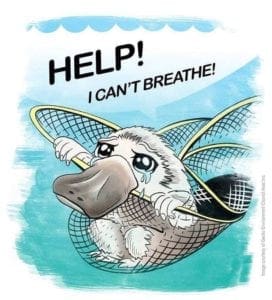
MEDIA RELEASE 13.11.19
Minister Matt Kean MP is committed to wildlife conservation issues and has offered us his full support as we work with government agencies to save our native wildlife in all its forms for the next generation of young Australians. The Minister expressed his strong support for our new alliance and promised to give us a ‘timeline’ for the implementation to ban the use of these opera house traps in NSW and implement a net exchange program to help save the platypus and other air breathing aquatic wildlife from drowning in NSW rivers.
Australian Wildlife Society CEO, Patrick Medway AM, expressed his gratitude and thanked AWS Director’s for their support of the official launch of the NSW Platypus and Turtle Alliance today. We are also indebted to the strong support from Stephen Kamper MP for Rockdale who hosted the Luncheon and helped set up the meeting with the NSW Minister Matt Kean MP. Stephen is also a long term member of the Society and has been instrumental in other wildlife conservation projects. The CEO also thanked Professor Richard Kingsford of UNSW for his ongoing expert advice on wildlife conservation issues and in particular for today’s launch of the alliance. The National President, Suzanne Medway AM, is delighted with the outcome to provide such support to help save the platypus in New South Wales MORE>>
WHERE TO NEXT?
Enclosed yabby traps are banned in Victoria, Australian Capital Territory, Tasmania, and Western Australia. The New South Wales Government recently gave away 5,000 open-top pyramid nets to recreational anglers as part of a comprehensive program to phase out the use of enclosed yabby traps in New South Wales from 30 April 2021. The Queensland Freshwater Fisheries Working Group is also considering implementing a ban on enclosed yabby traps.
| STATE | POSITION | ACTION |
| ACT | Banned | 17 September 2019 |
| TAS | Banned | Prohibitions in place |
| VIC | Banned | 1 July 2019 |
| NSW | Banned | 30 April 2021 |
| SA | Not Banned | Predicted mid-2023 |
| NT | Not Banned | TBA |
| WA | Banned | Prohibitions in place |
| QLD | Not Banned | Discussions occurring |
Not only is the platypus listed as Endangered in South Australia, but early this year, the platypus was officially listed as Vulnerable in Victoria and is at risk of extinction. On 23 November 2020, University of New South Wales researchers, along with the Australian Conservation Foundation, WWF-Australia, and Humane Society International Australia, submitted their recommendations to the Commonwealth and New South Wales Government’s scientific committees recommending that platypus be listed as a threatened species under Australia’s and New South Wales environmental legislation. This recommendation is currently being considered.
| STATE | Conservation Status |
| ACT | Protected |
| TAS | Protected |
| VIC | Vulnerable |
| NSW | Protected |
| SA | Endangered |
| NT | Not present |
| WA | Not present |
| QLD | Protected |
The Society will continue to advocate for a ban on enclosed yabby traps to prevent wildlife from the risk of entanglement and death.
– BAN ON ENCLOSED YABBY TRAPS IN NSW-
Enclosed yabby traps pose a risk to air-breathing semi-aquatic wildlife such as platypus, rakali, water dragons, and turtles. The New South Wales Government is giving away 5,000 wildlife-friendly yabby nets to recreational fishers as part of a comprehensive program to phase out the use of enclosed yabby traps in New South Wales from 30 April 2021.
In 2019, a team of platypus conservationists submitted an application to the Victorian Government advocating for the platypus (Ornithorhynchus anatinus) to be listed as Vulnerable under the Flora and Fauna Guarantee Act 1988.
In 2020, the Scientific Advisory Committee responded to the submission, noting they had made a preliminary recommendation that “The information presented in the nomination document (and further information provided to the Committee) appears to demonstrate that the Taxon is eligible for listing”.
In short, the Scientific Advisory Committee supports the nomination based on the evidence provided and that the platypus be listed in the Threatened list under the Flora and Fauna Guarantee Act 1988 MORE >>
The Scientific Advisory Committee sort public comment in late August 2020.
In January 2021, the platypus was officially listed as Vulnerable in Victoria. The Society now encourages the New South Wales and Queensland Governments to step up their game and follow Victoria’s lead.
MEDIA RELEASE 14.11.20 – Platypuses should be listed as Vulnerable in Victoria to enhance protections, scientific panel advises MORE>>
MEDIA RELEASE 10.01.21 – Australia’s platypus is now officially listed as Vulnerable in Victoria MORE>>
SPEAK OUT FOR THE PLATYPUS – We are working with other wildlife organisations and campaigning to get national protection for the platypus. Please sign the petition MORE>>
ENTANGLED WILDLIFE AUSTRALIA – The project aims to create an Australia-wide database of wildlife entanglements that can be used to identify risk hotspots, key risk factors, and the range (and prevalence) of species impacted MORE>> MORE>> Entangled Wildlife Template
MEDIA RELEASE 13.07.21 – Survey finds encouraging platypus numbers on Kangaroo Island MORE>>
MEDIA RELEASE 05.09.21 – Platypus to make a comeback into the Royal National Park MORE>>
MEDIA RELEASE 28.09.21 – Western Sydney conservationists battling to protect newly discovered platypus population from impacts of Black Summer fires land $55k from Landcare MORE>>
Platypus Alliance Members and Supporters


